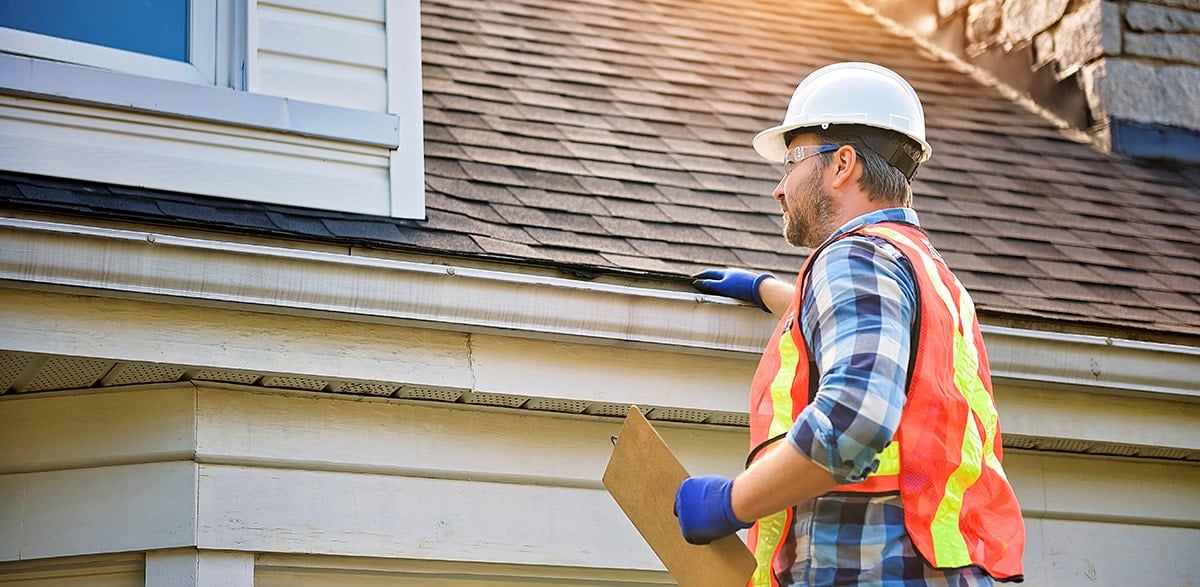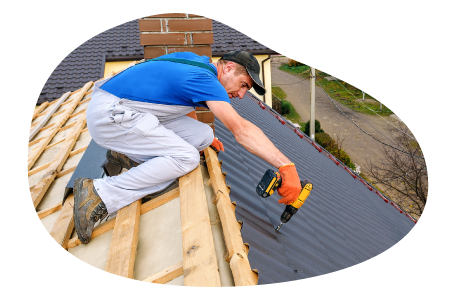Are roofing companies liable for damage? What to know

Roofing is a high-risk occupation. You’re working high up off the ground, jobsites can be filled with potential hazards, and many opportunities for property damage and bodily injury surround you.
If you own a roofing company or if you’re a homeowner considering a new roof, it’s important to understand what roofers are liable for. For example:
- Are roofers responsible for leaks?
- Are roofers responsible for flat tires from nails?
- Are roofers responsible for other damages?
This guide breaks down all the risks and explains what roofers are liable for in terms of damage, injury, and other potential incidents, as well as how they can protect themselves should something happen.
What damages are roofing companies typically held liable for?
If you’re a roofing business owner, you know a lot can happen on a jobsite. Typically, your company is responsible for any damage that’s caused during the duration of a project.
Here are some of the most common liabilities for roofers:
Property damage
Roofers are generally responsible for any property damage they cause to the home or building they’re working on, plus to any vehicles, landscaping, or other property within the vicinity of the project site.
For instance, a worker might drop their hammer, causing it to fall off the roof and break a ceramic lawn sculpture. It might happen because they're not paying attention, or because they were rough-housing with another employee. The roofing company could be held liable in either case, though your insurance likely has exclusions for wrongful acts and preventable risks.
When you're working on someone's property, it's important to reduce the risk of damage and loss. You might provide tool belts for your employees, or have a strict policy of cleaning up nails and debris around the worksite.
Poor workmanship and negligent acts
Roofers are typically responsible for losses caused by poor workmanship and other acts of negligence. For example, a property owner might sue your business if water drips through the ceiling after a new roof installation and damages their furniture.
Negligence claims are usually tied to a few obligations:
- Standard of care: Every company is expected to act reasonably and meet the standard of care for its profession. If you fail to do so, the client has the right to sue.
- Contract liability: If a contract was signed at the start of a job, the roofing company is responsible for certain claims and risks as defined by the terms of the agreement.
- Workmanship warranty: If you guarantee the quality of your company’s roofing work, you’re obligated to fulfill that promise, including repairs caused by faulty installation or worker error.
What defines negligence? There are a few answers to that question, including:
- Improper installation
- Failure to comply with regulations
- Use of substandard materials
- Subpar or incomplete work
- Failure to address the client’s concerns or roofing needs
This includes both unprofessional practices and situations outside of your control. For example, a supplier might fail to deliver materials on time, which forces your project to be delayed.
The result could be everything from a roof leak to a ventilation problem, safety hazard, or an aesthetic issue such as uneven shingles. A roofing company could be held liable for all of this and more.

Bodily injuries on a jobsite
Unfortunately, when it comes to large-scale, high-risk projects such as roof replacements, people can get hurt. Whether it’s the homeowner, a visitor, a contractor or a subcontractor, if the injury was related to your business's activities, you could be held responsible.
For instance, if an employee—or even a subcontractor—fails to secure a ladder or leaves a tool in a walkway, and someone gets hurt, the roofing company that’s contracted to complete the job could be held liable.
Third-party vehicle damage
Because of the proximity of many roofs to driveways or streets that allow parking, vehicles can get damaged when roofers are working above. If this damage is caused by your roofing business, you could face a potentially pricey claim.
For example, roofers are responsible for flat tires if they’re caused by nails or debris left on the property. Falling shingles and other items could also damage a vehicle and lead to a lawsuit against your company.
Common reasons roofers get sued
There can be a lot of confusion around what homeowner’s insurance covers and what contractors are liable for, and many people wonder, can you sue a roofing company? Yes, you certainly can—and it happens a lot.
Here are some of the most common reasons roofers get sued:
- Breach of contract: Failure to complete a job or meet the terms of a contract, such as deviating from agreed-upon details, including using different materials, not finishing the project by the stated deadline, or failing to address the client’s issues as promised.
- Faulty workmanship: A completed job that causes leaks or structural issues due to improper installation, substandard work, or the use of cheap or low-quality materials.
- Property damage: Damage or destruction of property during a roofing project, including the home, lawn, gutters, vehicles, boats, and any other property in the area.
- Debris-related accidents: Failure to remove nails, debris, and other project remnants from the property can cause damage even after a project is completed, including flat tires, damage to landscaping, and scratched vehicles.
- Bodily injury: Injuries that happen to homeowners, their guests, or employees due to dropped tools, failure to secure equipment, improperly trained subcontractors, or working despite a severe weather warning or other unsafe conditions.
When might a roofing company not be liable for damage?
It’s important to note that there are times when roofers aren’t responsible for damage. Understanding these circumstances can help you smoothly navigate client complaints and possibly dodge a lawsuit.
If you’re a roofer, you’re likely not liable if:
- Your team discovers pre-existing damage to the roof or surrounding property.
- A hurricane or other natural disaster causes roof damage after installation is complete.
- A problem is caused by factors outside the roofer’s scope of work, such as if a homeowner fails to properly maintain their new roof.
How long is a contract liable for a roofing project?
Each state has its own statutes that regulate the length of time a contractor is liable once a roof project is completed. For example:
- California law states a general contractor is liable for visible defects for up to four years and hidden defects for 10 years.
- In Michigan, a contractor’s liability for defective craftsmanship is six years and 10 years for gross negligence if a defect is found later.
- Florida contractors are liable for known defects for up to four years and hidden defects up to 10 years.
- New York law enforces a six-year limit for breach of contract and 10 years for bodily injury and property damage claims.
Of course, other factors can help define a contractor’s liability for a roof, including contract details, workmanship warranty terms, and certain local laws.
How roofers can protect their business
Let’s be honest, nobody likes a lawsuit. And although you can’t always avoid them, there are some things you can do to try and prevent them—or stay afloat despite them.
Here are some ways you can proactively protect your roofing business from client disputes and expensive lawsuits.
Outline clear contracts and documentation
Having a legally binding agreement and well-documented records for every job will protect your business and set clear customer expectations. This way, should a dispute arise, the originally agreed-upon terms are in writing.
- Use contracts that clearly define the scope of work, agreed-upon pricing, materials, workmanship and manufacturer’s warranties, and contingencies for unforeseen costs.
- Keep detailed records of all client communications, project progress, and any damage that exists before the start of a project.
Develop strong safety and cleanup practices
It’s important for roofers to maintain an orderly and safe jobsite to try and prevent property damage and bodily injuries.
- Follow Occupational Safety and Health Administration (OSHA) safety guidelines to help prevent injuries on the job.
- Create a worksite safety plan that addresses specific hazards and protocols.
- Require employee training on proper equipment use and safety standards.
- Use tarps to catch debris, tar, and nails in areas surrounding the jobsite, such as driveways, decks, and landscaping.
- Conduct daily roof inspections, using nail sweepers to collect stray nails and cleaning equipment to remove debris and discarded roofing materials.

Get business insurance coverage
Although state laws and contracts dictate what type of insurance is needed for roofers, there are several standard policies for roofing businesses:
General liability insurance
As a rule of thumb, Insureon agents recommend that roofing business owners purchase contractor general liability insurance first. This policy covers costs for third-party property damage or bodily injury, including medical expenses and legal fees.
To save money on your insurance, you can bundle a general liability policy with a commercial property policy in a business owner’s policy (BOP).
Contractor errors and omissions (professional liability)
Claims of poor workmanship or missed deadlines are covered by contractor errors and omissions insurance (E&O). Also known as professional liability insurance, this policy helps pay for legal costs when facing accusations of faulty craftsmanship.
Your insurance provider can typically add this coverage to your general liability policy, often at a discounted rate.
Workers’ compensation insurance
In most states, a workers’ compensation insurance policy is required for any construction business with at least one employee. Even in areas where those laws don’t exist, roofing is an extremely high-risk trade, making workers’ comp a critical part of any roofing contractor’s risk management plan.
Although sole proprietors aren’t legally required to buy workers’ comp, it’s something worth considering, as health insurance may deny work-related claims.
Commercial auto insurance
If your roofing business owns any trucks or vehicles, most states will require you to have commercial auto insurance. It covers the cost of repairs or injuries in an accident involving your vehicle.
Most personal auto insurance policies won’t cover damage from business use. If you use your personal vehicle for work purposes, such as driving between jobsites or running errands, you’ll need to purchase hired and non-owned auto insurance (HNOA).
Tools and equipment insurance
While commercial property insurance protects company-owned tools and equipment, it only covers the items you keep at your business address. To protect the supplies you take to different jobsites, you’ll need tools and equipment insurance.
This coverage pays to repair or replace mobile tools, equipment, and machinery that are lost, stolen, or damaged. Keep in mind that items more than five years old and costing more than $10,000 aren’t protected by this policy.
Umbrella insurance
Because roofers are more at risk for major accidents, purchasing umbrella insurance can provide an extra layer of protection so your company can financially survive the most expensive lawsuits.
For example, if a lawsuit maxes out your general liability coverage, an umbrella policy would step in to cover the rest of the money you owe for damages.
Surety bonds
Another type of protection roofers should consider is a surety bond. A bond guarantees your company will fulfill its contractual obligations to a client, or pay for any losses if you fail to do so.
Find the best insurance for your roofing business with Insureon
To recap, roofers can be held liable for leaks, property damage, bodily injuries, and even unexpected casualties like flat tires if these incidents are related to the roofing company's activities.
Roofing contractors and business owners can protect their companies by using clear contracts, adhering to safe work protocols, and having the right insurance coverage. A comprehensive risk management plan can help prevent lawsuits and provide peace of mind for you and your clients.
Fill out our brief online application to get quotes from top-rated U.S. insurance companies. Our expert agents can help you compare policies and get affordable roofing insurance, and your certificate of insurance (COI) will typically be issued in less than 24 hours.









